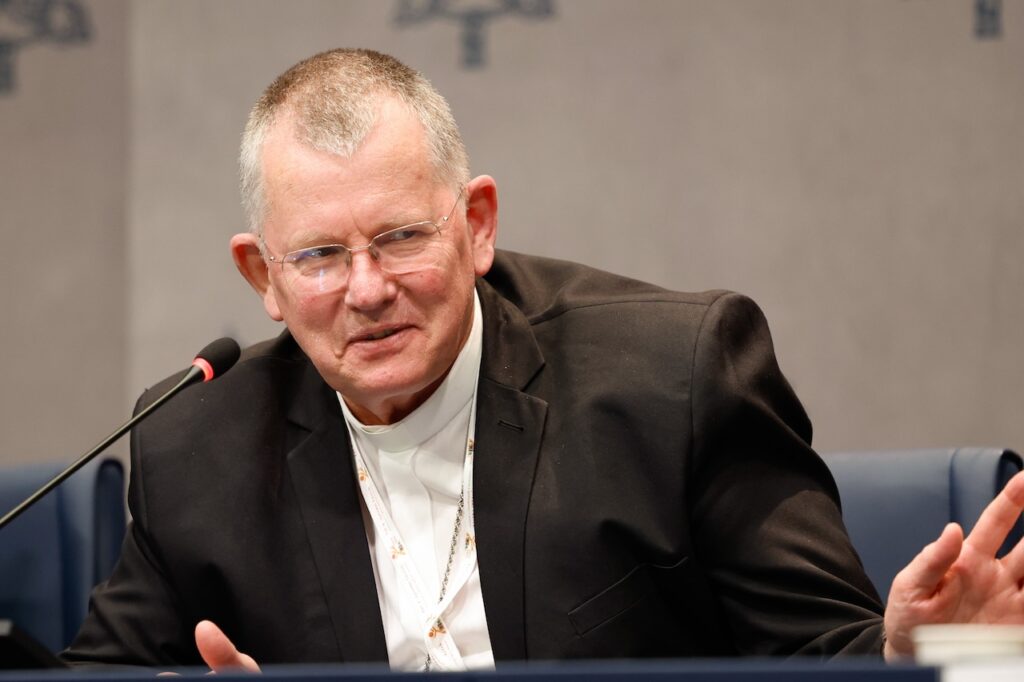VATICAN CITY (CNS) — Three months after the murder of Juan López, a Honduran Church worker and environmental activist whose death was publicly mourned by Pope Francis, the bishops of Latin America are raising awareness on attacks against those fighting for social justice in the continent.
Three newly created Latin American cardinals joined Cardinal Michael Czerny, prefect of the Dicastery for Promoting Integral Human Development, and Emilce Cuda, secretary of the Pontifical Commission for Latin America, at the Vatican Dec. 9 to launch a campaign, titled “Life Hangs by a Thread” (“La vida pende de un hilo”), that aims to support and promote human rights activists.
The campaign, supported by the pontifical commission and the Latin American bishops’ council, will amplify the stories of human rights defenders who have been threatened or killed; establish social dialogue meetings between business leaders, trade unions and Church representatives; organize training sessions to teach communication and negotiation skills for activists; and provide concrete support for local Church initiatives oriented toward social justice.
From 2013 to 2024, 38 Indigenous leaders were killed in the Peruvian Amazon and more than 500 cases of abuse against Indigenous children were documented, primarily linked to mafias that infiltrate illegal mining operations in the region, said Cardinal Carlos Castillo Mattasoglio of Lima, Peru.
“The Church cannot stop encouraging, inspiring, accompanying local initiatives in the world,” he said. “There are so many responses, the people are not silent, they are organizing themselves, but it is discouraging to do it alone.”
Cardinal Jaime Spengler of Porto Alegre, Brazil, president of the Latin American bishops’ council, known by the acronym CELAM, said that on the continent “there are many social leaders and civil actors who are at risk.”
“The blood of hundreds of murdered leaders in Latin America and the Caribbean call for justice, and we cannot remain indifferent,” he said. “To honor their memory, we have the duty to make known their efforts to denounce the culture of death that develops from a capitalist and extractive economic model and transnational crimes related to drug trafficking.”
Cardinal Czerny said the role of the Vatican is to support the Church in Latin America in confronting problems and to encourage the Church in each country to raise its voice against the violence.
“It is there where the governments are really listening,” he said. “Our encouragement is to the bishops’ conferences, to the bishops, to those who work with them, to bring these cases, these tragedies, these atrocities, to public opinion and to the government.”
For that reason, the stories of human rights defenders will be shared through the Platform for Peace, Democracy and Human Rights organized by the Latin American bishops, which brings together Church organizations throughout the region to promote peace and defend human rights.
After widespread debates in the 1970s, the Church declared that “the challenge of the Gospel includes the preaching of social justice,” Cuda said. “Social justice is the real and effective way of putting (the Gospel) into practice, with words and gestures.”
In Latin America, therefore, “these martyrs, who die for the Gospel, for the documents that the Holy Father promulgates and that come from the Roman Curia, such as Laudato Si’ and Fratelli Tutti: these people are the ‘saints next door,’ and we must recognize, as the Holy Father invites us to do, the holiness also of these people, and not only of those who lead ascetic lives,” she said.

